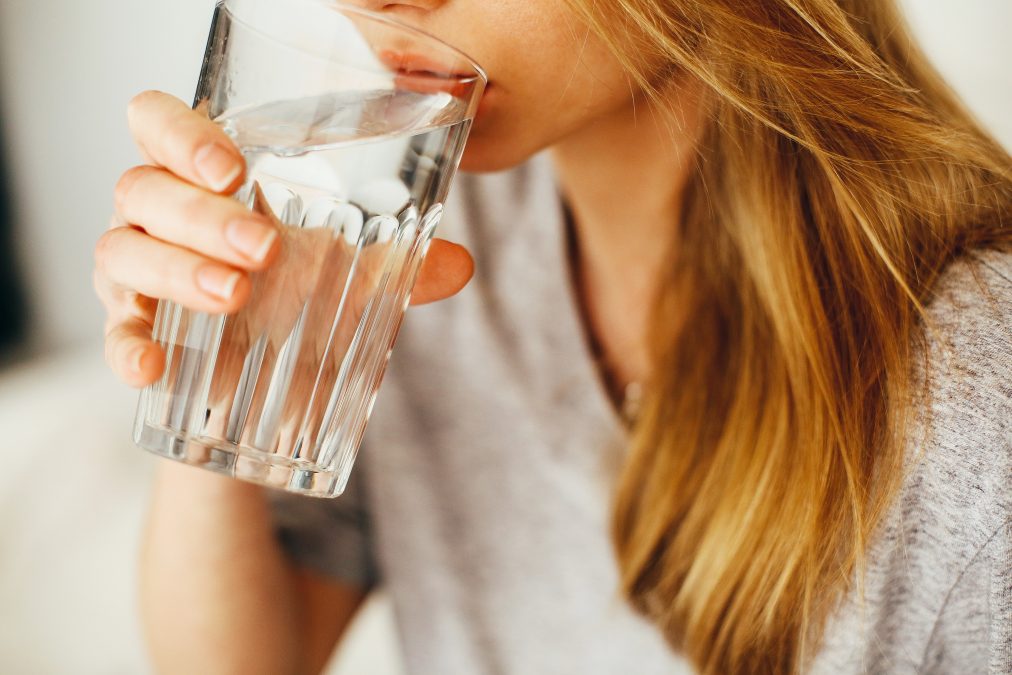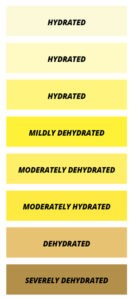The Importance of Hydration

Did you know that by the time you feel thirsty it’s too late…. You’re already dehydrated!
But why is hydration important?
Water has numerous functions within the body:
- Keeps you cool: It regulates your internal body temperature through sweating and respiration
- Helps muscles work better: Helps dissolve and transport minerals and nutrients making them accessible to your body
- Helps joints work better: Lubricates & Protects tissues, spinal cord, and joints
- Prevents dryness: Moistens tissues of your eyes, mouth and nose and forms saliva.
- Helps cleanse your body: Lessens the burden on your kidneys and liver by flushing out waste mainly through urination.
- Protects your body’s organs and tissues.
As water has multiple important roles within the body dehydration can have a negative impact on both cognitive and physical performance. So how can you recognize if you are drinking enough or if you are in a mild state of dehydration?

Signs of dehydration:
- Little or no urine
- Urine that is darker than usual (see water colour chart)
- Dry mouth
- Sleepiness or fatigue/ lack of energy
- Poor mood
- Extreme thirst
- Headache
- Confusion
- Dizziness or light-headedness
- Loss in body weight post exercise
How much water should you drink:
The male body has a higher water percentage than the female body and so males require a higher daily water intake of 3-3.7 litres. Females should consume 2-2.7 litres of water on a daily basis.
A more individualised way to calculate how much water you should be consuming to multiply your body weight in kilograms by 33ml. For example a 70kg person should be drinking 2.31L of water a day (70*0.033 = 2.31L).
Following physical activity 1.5L per kilogram body weight lost should be consumed to adequately rehydrate. Or if you don’t have a scale simply drink frequently until you started to urinate.
Every person is different and hydration requirements vary from person to person depending on a number of factors including medical conditions, climate, physical activity and certain medications. A simple way to tell if you’re getting enough water is by the color of your urine.
Pale and clear urine = hydrated
Dark urine = drink more fluids
Tips to help stay hydrated:
- Drink 500 – 1,000ml first thing in the morning: This will help rehydrate after a long period without water consumption can.
- Invest in a reusable water bottle: This will help you track your water intake each day.
- Infuse your water: Whether you prefer limes, lemons, berries, or cucumbers, infusing your water with fresh fruit and mineral salts will help you stay hydrated, without any added artificial sweeteners, preservatives or extra calories.
- Drink before you snack: We all can relate to that needed snack or hungry feeling. Before reaching for the nearest source of calories, drink some water. It has been shown that sometimes our brains confuse thirst with hunger, so next time try hydrating before eating and your hunger pang might vanish.
- Sticking with water when possible: This will help you skip the unnecessary sugars, additives, and caffeine found in other drinks.
- Schedule your water: This will help you stay on top of our hydration and stave off any of the unwanted side effects of dehydration.
Sheena Lynch, MScPT, Dry Needling, MISCP

About twice a month our therapists will be posting answers to commonly asked questions. So, if you have a burning question that you want answered let us know in the comments below.
We can cover anything ranging from active rehabilitation, to injury prevention.
This week our featured therapist is Sheena Lynch. To learn more about Sheena check out our PhysioWorks team.


Leave a Reply